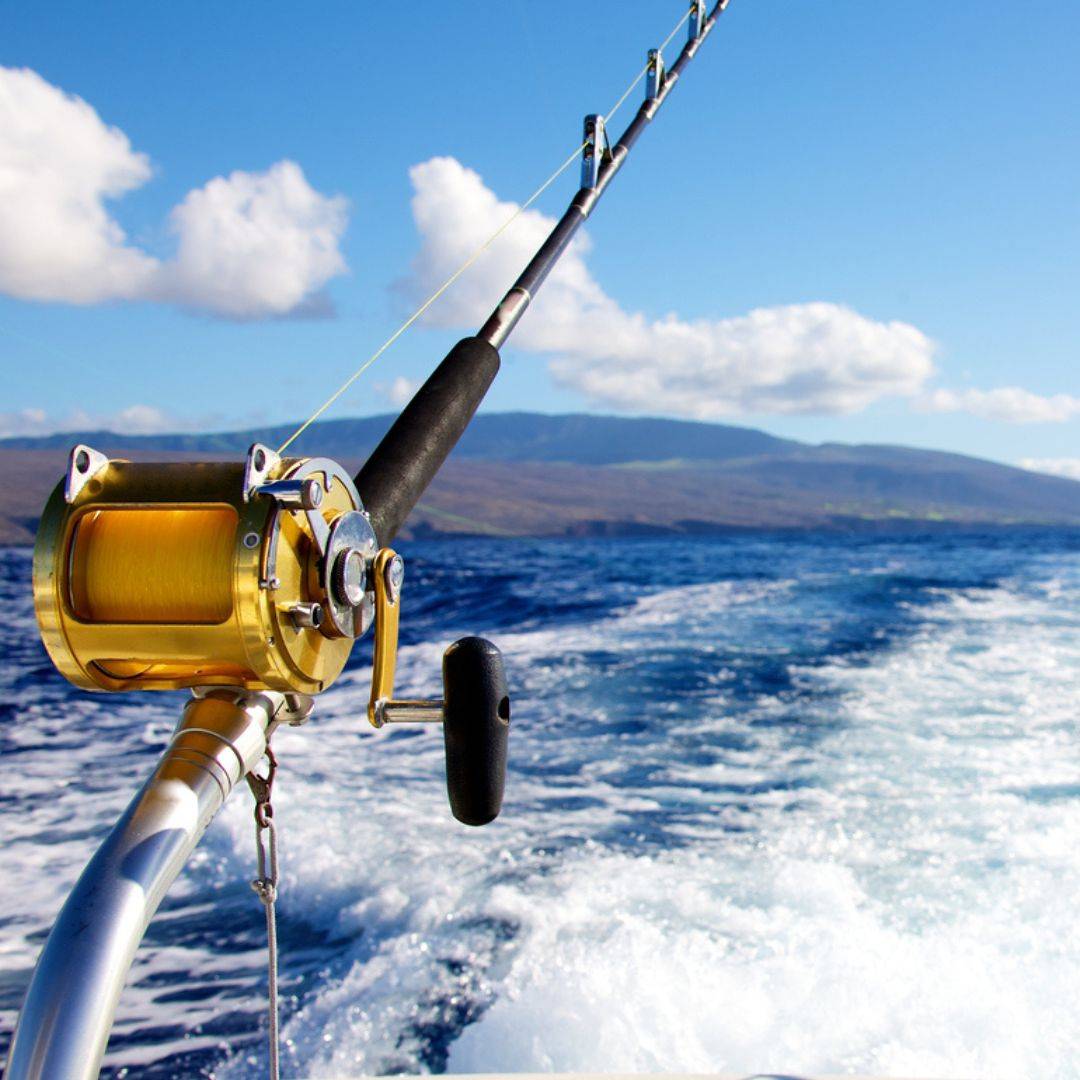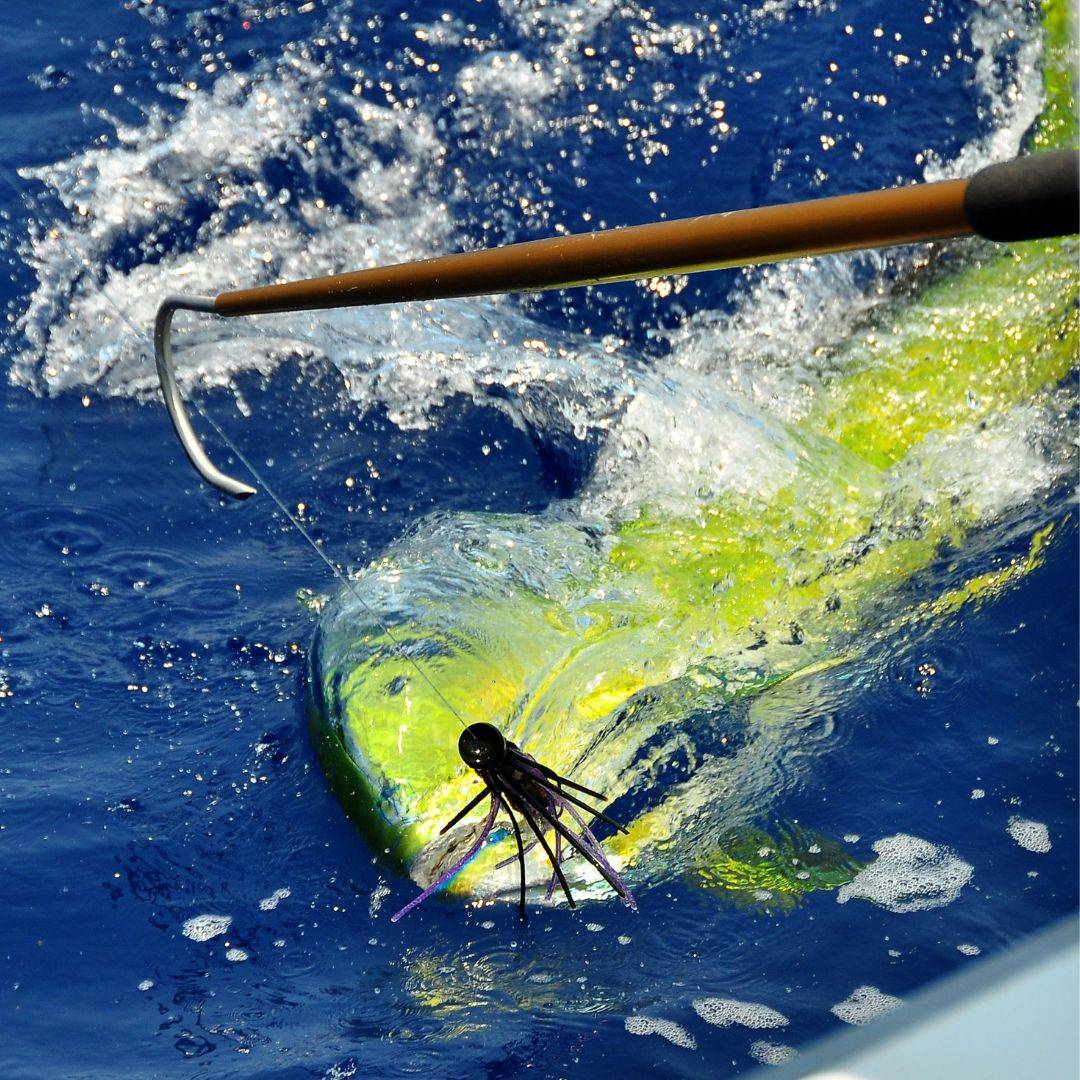Your Cart is Empty

Are you passionate about your offshore fishing and looking to level up your mahi fishing? If so, you've come to the right place. Welcome to our comprehensive guide to mahi fishing, where we'll equip you with all the tips and tricks you need to succeed offshore.
Whether you're a novice angler or a seasoned pro, this guide will empower you to navigate the offshore world of mahi fishing with confidence and finesse. So, grab your fishing gear and get ready for an adventure like no other as we unlock the secrets of successful mahi fishing.
Topics discussed:
ESSENTIAL GEAR AND EQUIPMENT FOR MAHI FISHING
OFFSHORE FISHING LOCATIONS FOR MAHI
Mahi-mahi are best known by their Hawaiian name meaning “very strong”. They are also known as dolphinfish or dorado and are a member of the Coryphaenidae family with their closet relatives being remora, cobia, and jacks.
Mahi-mahi are schooling fish, and are most commonly found in large groups. They are very social animals, and they often travel and feed together. Mahi-mahi are also very curious fish and will often approach boats and other objects in the water.
Mahi are voracious eaters consuming as much as 20% of their body weight per day. They reach a sexual maturity in as little as 4 months. In captivity, they have been documented to grow as much as 3” per week. Basically mahi just eat and “make little mahi”. This makes them very susceptible to being caught and making them very popular among offshore anglers.
To increase your chances of success when fishing for mahi, it's essential to have the right gear and equipment. Here are some must-have items to consider adding to your arsenal:
Rods and reels: A medium action fishing rod, preferably 6 to 7 feet in length, is a good starting point for mahi fishing. Pair that with a high-quality reel that includes a smooth drag system, a high gear ratio, and a high line capacity to handle the powerful runs and jumps of mahi. A spinning reel is a solid choice for mahi fishing because of its light weight and versatility.
Main Line: Two available options include monofilament and braided lines. Monofilament line is a cheaper, larger diameter option. The main advantage of monofilament is the stretch it offers providing a cushion against sudden strikes.

The second option is braided line. Braided line is a smaller diameter line with zero stretch but providing greater sensitivity.
The optimum setup is a base of braided line with a monofilament top-shot of 100 yards or so. It provides plenty of line capacity as well as the shock-resistance of the monofilament.
Line strength of 30-50 pounds should suffice for most mahi fishing and still provides plenty of line capacity for those large bull dolphin!
Join braid and monofilament lines using an FG or double uni-knot.

Leaders: Leaders provide a durable section between the main fishing line and the lure. Three main options for leader material include monofilament, wire, and fluorocarbon. Monofilament leaders are sufficient for mahi fishing.
Swivels: Include a high quality barrel swivel between main line and the leader. This minimizes the opportunity for twists in the line.
Polarized Sunglasses: A good pair of polarized sunglasses is great addition for mahi fishing. Often mahi can be spotted along floating debris or trailing a hooked mahi. These sunglasses reduce glare and allow fish to be more easily spotted.
Mahi are strong fish. Always use quality equipment and bring back-up supplies to avoid disappointment. While on the water, monitor your gear regularly for any signs of wear and tear and replace any damaged components.
When it comes to mahi fishing, location is key. These vibrant fish can be found in a variety of offshore habitats, including weed lines, floating debris, and offshore structures. Here are some prime fishing spots to consider when targeting mahi:
Weed Lines: Mahi are often found near weed lines, which provide them with food and shelter. Look for areas where seaweed or floating vegetation accumulates, as these are likely to attract mahi. Trolling along weed lines or casting near them can yield great results.

Floating Debris: Floating debris, such as logs, tree trunks, and trash, can provide mahi with a safe haven and a source of food. These objects create an artificial structure that attracts baitfish, which in turn attracts mahi. Keep an eye out for any floating debris while offshore and approach cautiously to avoid spooking the fish. Any debris, even as small as a 5 gallon bucket, can attract large schools of mahi.
Offshore Structures: Offshore structures, such as oil rigs, buoys, and FADs (Fish Aggregating Devices), can be hotspots for mahi fishing. These structures create an artificial reef, attracting a variety of marine life, including mahi. Trolling around these structures or casting near them can produce impressive catches.
Pods of flying fish: Flying fish are a favorite mahi food. Look for flying fish while traveling. If you come across a good number of flying fish, there is a good chance mahi are around. I can’t tell you the number of times I have blown past flying fish headed to a “hot spot” only to return later to find mahi.
Mahi are opportunistic feeders and can be enticed with a variety of natural baits. The key is to present them with something that mimics their natural prey and triggers their predatory instincts.
Here are some of the best baits to use when targeting mahi:
Squid: Squid is a highly effective bait for mahi fishing. Their soft bodies and natural movements make them an irresistible treat for mahi. Use a whole squid or cut it into strips to create a tempting presentation.
PRO TIP: Use a Weedless Squid Rig to troll for mahi in scattered grass.
Ballyhoo: Ballyhoo is a common baitfish found in tropical and subtropical waters, making it a favorite snack for mahi. Ballyhoo can be pin rigged or bought as pre rigged ballyhoo.
PRO TIP: Consider using cigar minnows for mahi when the action is hot. Cigar minnows are an oily fish providing a good scent trail in the water. Additionally, cigar minnows are much cheaper than ballyhoo and can be rigged quickly.
Keep in mind that mahi are visual predators, so using baits with vibrant colors and lifelike movements can increase your chances of success. Mahi are also cannibalistic, often feeding on smaller mahi. Green/yellow as well as pink/blue are good color combinations.
In addition to natural baits, artificial lures can also be used to catch mahi. Here are some of the best lures to consider adding to your tackle box:
Soft plastic trolling lures: Soft plastic bodied lures and skirted artificial lures are popular lures for catching mahi. Choose lures that mimic fleeing baitfish or squid are really good choices. The Dolphin Weenie is a good example of a skirted lure that works well for mahi. Another good choice is a Lil’Stubby. This is a flat faced trolling lure produces extra commotion in the water that can drive dolphin crazy. These lures do not need any additional bait, but a strip bait cut from a dolphin belly can add additional appeal.
Spreader bars and daisy chains: Mahi are schooling fish. Often traveling and feeding in large schools. They tend to feed on schools of baitfish. Mahi trolling spreads that imitate a baitfish school can be very productive. Two good examples are Mahi Madness(small mahi spreader bar) and Schoolie Daisy Chain (squid daisy chain). These lures can be used in conjuction with either a plastic trolling lure or any of the natural baits.
Diving hardbaits: Mahi are generally caught near the surface, but a lipped diving lure is often a good addition to a mahi trolling spread. These lures can reach depths of up to 20’ and can sometimes turn a so-so day into a great day. Consider a Nomad Design DTX Minnowor similiar lure.
Surface Poppers: Surface poppers are a topwater lure and can be incredibly exciting to use when targeting mahi. These lures create a commotion on the water's surface, mimicking the splashing and fleeing behavior of baitfish. Mahi are known to aggressively strike surface poppers, providing anglers with exhilarating topwater action. A Yo-Zuri Mag Popper or similar can add a lot of excitement to a mahi trip.
To maximize your chances of catching mahi, it's important to employ the right techniques. Here are some tried and tested methods to help you succeed in your mahi fishing endeavors:
Live Baiting: Live bait fishing is always an exciting way to catch fish. Mahi will strike a variety of live baitfish including cigar minnows, ballyhoo, menhaden, and mullet. Use live bait rigs and allow baits to swim freely around weed lines, floating debris, or other structure.
Casting: There’s no fancy method when it comes to targeting Mahi with this technique. The majority of successful hookups simply involve casting at weed lines, buoys, floating objects, or even passing schools of fish.
Use lightweight spinning or casting tackle and present your bait or lure near the fish. Mahi are known to be curious and aggressive, so a well-placed cast can often trigger a strike.
Trolling: Trolling is a popular technique for targeting mahi. Troll a combination of lures and baits, such as skirted trolling lures or natural bait. Rod riggerscan be very helpful to widen your mahi trolling spread when fishing from a boat without outriggers.
Find out more about optimizing your speed when trolling for mahi.
Keep an eye out for any signs of activity, such as birds diving or fish jumping, as these can indicate the presence of mahi.
Bailing dolphin: Mahi often travel in large schools especially small to medium size fish. When reeling mahi, be observant for other mahi that may be following. As schooling mahi follow a hooked fish to the boat, it presents a unique technique to catch a limit of mahi very quickly. The technique is bailing dolphin. The key to bailing dolphin is keeping bait and one hooked mahi in the water at all times.
If a school of mahi follow a hooked mahi to the boat, do not take the hooked mahi out of the water. Cut up small chunks of squid and throw it into the water. Hook a piece of the squid on a hook and pitch it into the water. Add more bait in the water as mahi eat the bait. When a second mahi gets hooked, the first one can be brought into the boat. Continue the process until the mahi leave or you get your limit. This is a really good way to catch a lot of mahi and it is a lot of fun!
Congratulations! You've reached the end of our ultimate guide to mahi fishing. Armed with the knowledge and techniques shared in this guide, you are now well-equipped to embark on your own mahi fishing adventures.
Remember to always prioritize safety while offshore and adhere to local fishing regulations to ensure the sustainability of mahi populations. Respect the environment and practice catch and release whenever possible, allowing future generations to enjoy the thrill of mahi fishing.
Now, gather your gear, study the local fishing reports, and head out to your favorite offshore fishing spot. Whether you're targeting mahi for the thrill of the fight or to enjoy their delicious flesh, may your adventures be filled with success and memorable experiences. Happy mahi fishing!